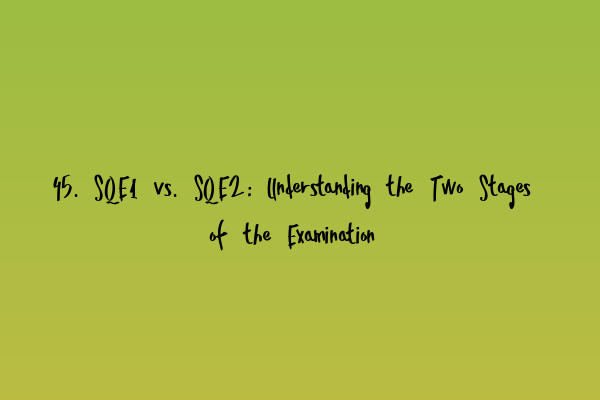45. SQE1 vs. SQE2: Understanding the Two Stages of the Examination
Are you considering a career in law? If so, you may have heard about the Solicitors Qualifying Examination (SQE). This new examination is set to replace the traditional routes to qualifying as a solicitor in England and Wales, and it is important to understand its two stages: SQE1 and SQE2. In this article, we will explore the differences between SQE1 and SQE2 and how they fit into the overall examination process.
Before diving into the details, it’s essential to have a clear idea of what the SQE is all about. The SQE is a two-part examination designed to assess candidates’ competence to practice law. It is intended to provide a more consistent and accessible pathway for aspiring solicitors. Now let’s examine the two stages of the SQE in more detail:
SQE1: Building a Solid Foundation
SQE1 serves as the foundation for the SQE examination process. It focuses on testing candidates’ knowledge and understanding of core legal principles. This stage primarily consists of multiple-choice questions (MCQs) and is conducted on a computer in controlled conditions. It’s designed to ensure that candidates have a solid understanding of the foundational areas of law.
To succeed in SQE1, it is essential to develop effective strategies for tackling MCQs. These strategies can include techniques such as identifying keywords, elimination of incorrect answer choices, and time management. To learn more about effective strategies for tackling SQE MCQs, check out our related article on Strategies to Tackle SQE MCQs: Mastering Multiple-Choice Questions.
SQE2: Mastering Practical Skills
Once candidates have successfully passed SQE1, they move on to SQE2, the second stage of the examination. SQE2 is designed to assess candidates’ practical legal skills, focusing on their ability to apply legal knowledge to real-world scenarios. This stage consists mainly of scenario-based questions that require candidates to analyze and solve complex legal problems.
To excel in SQE2, it is crucial to become a master problem-solver. This involves developing a systematic approach to tackling scenario-based questions and honing your analytical skills. Our related article on Scenario-Based Questions in SQE2: Become a Master Problem-Solver provides valuable insights and tips on how to approach and succeed in this stage of the examination.
Understanding the Examination Pattern
Now that we have covered the two stages of the SQE, it is crucial to have a clear understanding of the overall examination pattern. The SQE is not your typical law exam, and knowing what to expect can help you better prepare.
For a comprehensive guide to the SQE exam pattern, make sure to read our related article on Demystifying the SQE Exam Pattern: Knowing What to Expect. This article provides detailed information on the structure of the examination, the types of questions you can expect, and the time allocation for each stage.
Proven Strategies to Ace the SQE
As the SQE brings about significant changes to the qualification process for solicitors, it is crucial to develop effective strategies to succeed in this new examination. Our related article on SQE Strategies: Proven Tactics to Ace the Solicitors Qualifying Examination offers valuable insights and tactics to help you excel in the SQE. From effective study techniques to time management tips, this article provides a comprehensive guide to maximizing your chances of success.
Applying Knowledge in Real-Life Scenarios
One essential aspect of the SQE is the ability to apply legal knowledge to real-life situations. This is where case studies come into play. Understanding how to approach and analyze case studies is crucial for success in the SQE. Our related article on SQE Case Studies: Applying Knowledge in Real-Life Scenarios explores the importance of case studies in the SQE and provides tips on how to effectively approach them.
In conclusion, the SQE is a two-part examination that assesses candidates’ competence to become solicitors in England and Wales. SQE1 focuses on core legal knowledge, while SQE2 assesses practical skills. To succeed in the SQE, it is crucial to develop effective strategies and understand the exam pattern. By utilizing the resources provided in the related articles mentioned throughout this post, you will be well-equipped to navigate the SQE journey and achieve your goal of becoming a qualified solicitor.
